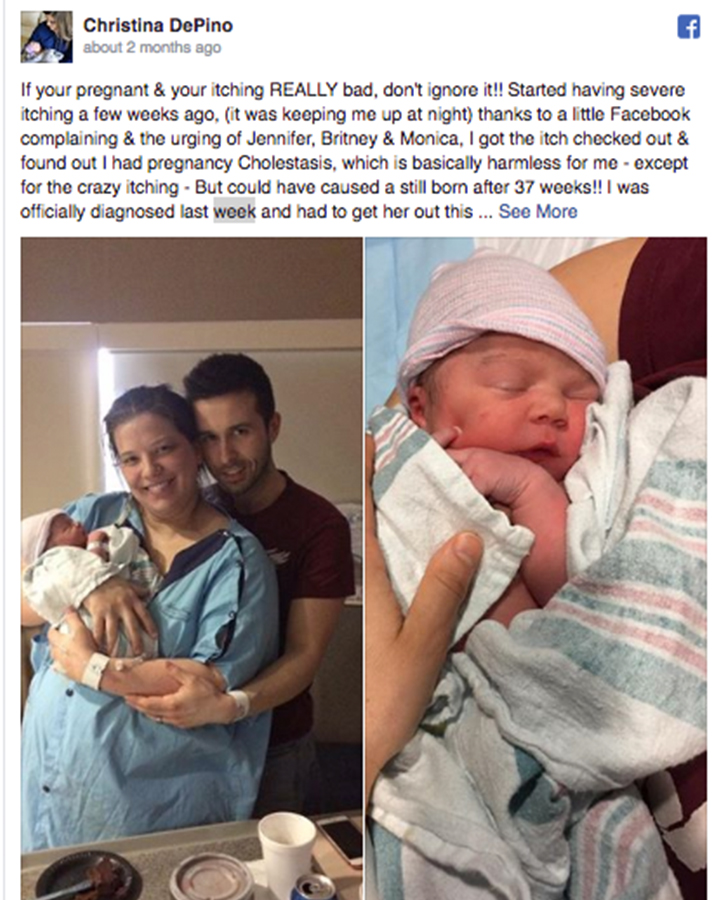
Image: iStock
Itchy skin during pregnancy is not a surprise. The speed at which your baby is growing in the womb is directly proportional to the increase in itchiness. This happens because the skin is stretching day after day to make space for the baby. Itch and skin irritation are common side effects of pregnancy, but hang on! It might not be as simple as it seems. A Michigan-based mother Christina DePino warns expecting mothers in their third trimester to be watchful of the severity of itching. In her Facebook post, she clearly alerts pregnant women that extreme itchiness could be a cause of serious health complication.
In Christina’s words “If you’re pregnant & you’re itching REALLY bad, don’t ignore it!!” She further explains what this itch actually means “Started having severe itching a few weeks ago, (it was keeping me up at night) thanks to a little Facebook complaining…I got the itch checked out & found out I had pregnancy cholestasis, which is basically harmless for me—except for the crazy itching—but could have caused a stillborn after 37 weeks!!” Christina was diagnosed with pregnancy cholestasis in the second week of March and was induced just a week later. She concludes by saying, “We are so blessed,” “Thanks guys for giving some amazing advice which may have just saved our precious girl’s life!”
Image: Facebook: christina.depino
And now that we are talking about Cholestasis let’s understand this condition in more detail.
What is Cholestasis?
Cholestasis during pregnancy, also known as intrahepatic or Obstetric Cholestasis is a prenatal condition that reduces the flow of a digestive fluid called bile from a woman’s liver to the duodenum.
What the symptoms of Cholestasis
The intense itching in hands, feet and other parts of body during the third trimester is a prominent symptom of Cholestasis. Other than severe itching, loss of appetite, biliousness and jaundice also direct to this condition. What differentiates this itching from the regular itching is that it’s intolerable and worsens at night. Pale stool and dark urine are also the symptoms of obstructive cholestasis.
Risks of cholestasis
If not treated at the right time, Cholestasis can lead to pre-term or stillborn birth. This happens because the bile acids jump the placental wall and attack the heart of the baby. The highest risk of Cholestasis is after the 37th week of pregnancy.
Causes of Cholestasis
According to Dr. Michael Cackovic, M.D., obstetric director of the maternal cardiac disease in pregnancy program at The Ohio State University Wexner Medical Center, the causes of Cholestasis are not clear yet. Though there are some theories citing family history of cholestasis of pregnancy being one of the causes. Women with twin pregnancy or a history of liver disorders are also more prone to Cholestasis.
If a pregnant woman is genetically susceptible to Cholestasis, hormonal imbalance during the third trimester adds to it. According to Dr. Christine Greves, M.D., an ob/gyn at the Winnie Palmer Hospital for Women and Babies, an expecting mother’s estrogen levels are at their highest after the 36th week of pregnancy. These levels could set Cholestasis in motion. Pregnant women diagnosed with gestational diabetes and preeclampsia are also prone to the risks of cholestasis.
Treatments to cure Cholestasis
Cholestasis can be diagnosed in pregnant women with a simple blood test. The medication usually comprises of ursodeoxycholic acid which decreases the level of bile in blood, smoothening blood flow to the liver. As Dr. Cackovic puts it “We definitely know it helps with the itching but we think it helps with the baby’s adverse outcomes too,” He further adds that labor should be induced before 37 weeks in order to lower the risk of stillborn birth.
Christina DePino discussed the itching with her doctor at the right time and gave birth to a healthy baby girl after fighting Cholestasis. She joked calling herself “the crazy lady running around telling all the preggie ladies to beware”
So mommies to be, don’t panic. Talk to your doctor.













